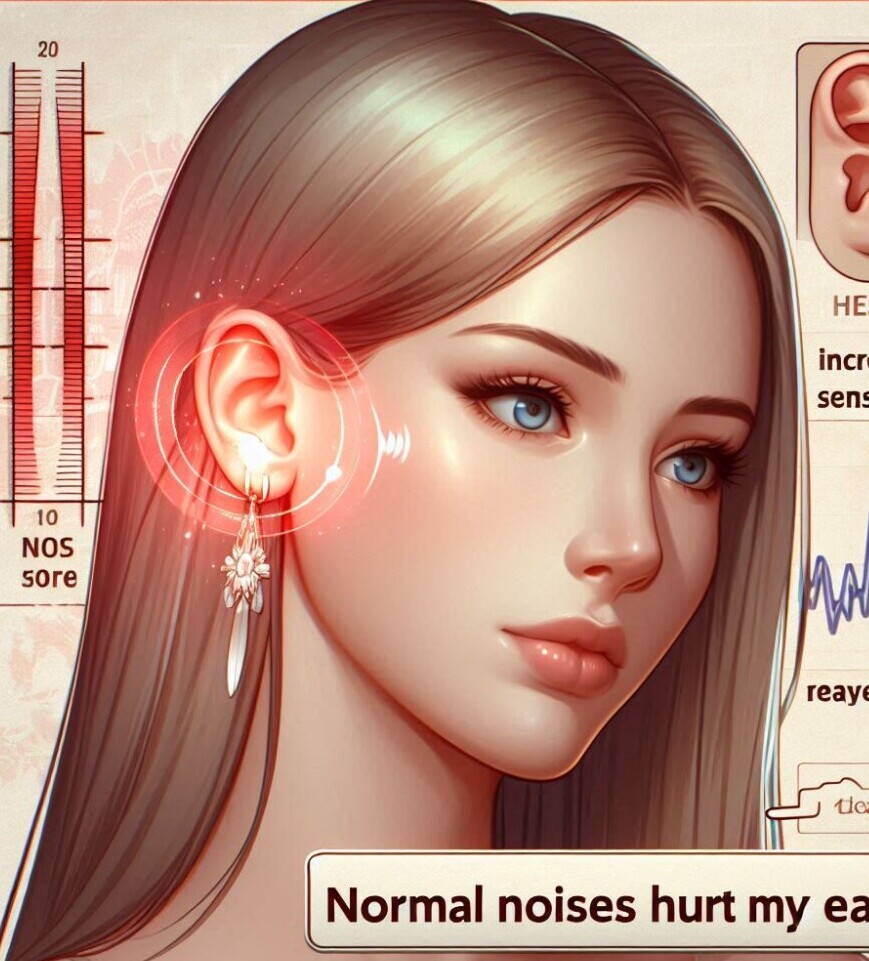Sound disorders can sometimes be puzzling because they affect our everyday experience in ways we don’t often think about.
In this article, I dig into two common conditions: tinnitus and hyperacusis. These conditions are sometimes confused or occur together, so it is useful to understand both and how they differ.
I cover what each condition is, symptoms to watch for, common causes, and potential treatments.
Introduction
Our ears play a key role in how we interact with the world. When something goes wrong with our hearing, it can be confusing and distressing.
Tinnitus involves hearing sounds without an external source, while hyperacusis is an extreme sensitivity to everyday sounds. Though different, they can occur together, complicating both diagnosis and treatment.
Whether you are experiencing one of these issues or are simply curious, I hope you find this information clear and useful. And remember that if you have any questions, leave them below and I promise to get back to you, deal?
Great!
Let’s get started.
What is Tinnitus?
Tinnitus is the perception of noise or ringing in the ears when no external sound is present. People might hear ringing, buzzing, hissing, or clicking sounds. The noises can vary in pitch and may be continuous or intermittent.
For me, Tinnitus is a constant loud “flatline” noise. You that hospital “flatline” noise that you hear on TV shows? Yeap, that’s what my tinnitus sounds like. You can read my story as to how I got tinnitus in the first place.
It might affect one or both ears. For many, tinnitus is a minor, temporary annoyance, but for others, it becomes a persistent disruption. There are two main types: subjective tinnitus, heard only by the person, and the much rarer objective tinnitus, which sometimes can be detected by a doctor.
Common causes include long-term exposure to loud noises, age-related hearing loss, ear infections, wax build-up, and certain medications. Health issues such as Meniere’s disease are also linked with tinnitus.
What is Hyperacusis?
Hyperacusis is characterized by an increased sensitivity to everyday sounds. For someone with this condition, even soft noises may feel uncomfortably loud. This heightened sensitivity can result in a painful auditory experience for many.

While most people do not second-guess everyday sounds like a phone ring or a refrigerator hum, those with hyperacusis may find these noises distressing, leading to anxiety, disruption in daily activities, and even social isolation.
Triggers for hyperacusis include noise trauma from sudden loud sounds, head injuries, and some neurological conditions. It is also associated with TMJ disorders and other issues affecting the ear or jaw. Often, individuals with tinnitus also experience hyperacusis, which adds complexity to both diagnosis and treatment.
Tinnitus vs. Hyperacusis: Key Differences
The main difference lies in the auditory experience. Tinnitus involves hearing sounds that are not present, whereas hyperacusis is an exaggerated reaction to everyday sounds, making them seem much louder or even painful.
To compare:
- Tinnitus: Involves hearing noises like ringing, buzzing, or hissing without an external source.
- Hyperacusis: Regular sounds are experienced as unusually loud or uncomfortable.
It is not uncommon for someone to have both conditions, which can intensify their overall impact on daily life.
Diagnosing Tinnitus and Hyperacusis
Getting a proper diagnosis is the first step in managing these conditions effectively.
A mix of audiological and sound tolerance tests helps determine if your hearing falls within the normal range or if there are deviations that need attention.
Often, individuals are referred to an ENT specialist who checks for physical issues such as ear infections or wax build-up.
A thorough evaluation may include reviewing your medical history, conducting specialized hearing tests, and occasionally performing imaging studies if structural issues are suspected.
This careful evaluation is very important because treatment options vary depending on whether a person has tinnitus, hyperacusis, or both.
Let me talk about treatment options if you are suffering from Tinnitus.
Treatment Options for Tinnitus
Managing tinnitus involves a variety of approaches and ultimately depends on the severity of the symptoms. While there is no single cure, several strategies can help reduce its impact.
Hearing aids are a common option. Many modern devices include tinnitus masking features that introduce ambient sounds to lessen the perception of ringing or buzzing. Similarly, white noise machines or sound therapy devices generate soft, neutral background sounds meant to distract from the phantom noises.
For me, my Phonak is a lifesaver in helping me mask my Tinnitus symptoms. With my hearing aid, I would not have been able to do my pharmacy job or even interact with people on a day-to-day basis.
I have written reviews on various OTC hearing aids. Feel free to learn about the Jabra Enhance, the Vivtone, Audien Atom 2, and the Mach 2 PRO.
Cognitive Behavioral Therapy (CBT) is frequently used to alter the way a person perceives and reacts to the tinnitus, often giving a boost to one’s ability to cope. Techniques such as mindfulness and relaxation exercises are also employed to help reduce stress associated with tinnitus.
Lifestyle changes can also make a big difference.
Adjusting your diet, ensuring adequate sleep, and avoiding substances like caffeine or alcohol may help reduce symptoms. Some supplements have been discussed for tinnitus relief, but these should only be tried after consulting with a healthcare professional.
Point of Interest: For me, caffeine does not affect my tinnitus. I sometimes visit my local coffee shop and have three cups of their bottomless brand and I am still all good.
Treatment Options for Hyperacusis
Unlike tinnitus, there isn’t a single cure for hyperacusis, but several strategies can help manage the increased sensitivity to sound.
Sound desensitization therapy involves gradually exposing a person to sound in a controlled way to help retrain the brain’s response to everyday noises. This method can gradually make normal sound levels more tolerable.
Tinnitus Retraining Therapy (TRT) is another option, especially for those who experience both conditions simultaneously. TRT combines sound therapy with counseling to help the brain learn to filter out unwanted noise. Soft noise generators are often used to balance out sudden bursts of sound that cause discomfort.
Counseling is very important as well; addressing the emotional impact of hyperacusis can be just as crucial as treating the physical aspect. While the use of earplugs might seem like a straightforward solution, overuse can increase sensitivity over time. Controlled exposure to ambient sound—under professional guidance—tends to be a more effective strategy.
A combination of these treatments, often arrived at through trial and error, can provide the best relief.
Living with Tinnitus and Hyperacusis
Adapting your daily routine is essential when living with tinnitus and hyperacusis. Over time, learning to manage these conditions can help you enjoy a fuller, more balanced life.
Protection of your ears is important, yet it is equally vital not to isolate yourself from everyday life. Overusing earplugs can prevent your ears from naturally getting used to different sounds. Instead, consider moderating your exposure to loud noises and use protective measures like noise-cancelling headphones when necessary.
Joining support networks or online communities can also be very helpful. Sharing experiences with others facing similar challenges provides comfort and practical tips that can make managing these conditions easier.
Maintaining mental well-being is key.
Therapy or counseling might be recommended to help deal with both the symptoms and the social or emotional effects. A balanced lifestyle that includes regular exercise, proper sleep, and stress-reduction techniques can greatly improve quality of life.
Final Thoughts
The ride to understanding and managing tinnitus and hyperacusis may be challenging, but early intervention and consistent treatment can make a significant difference.
Recognizing the difference between hearing sounds that aren’t there and experiencing discomfort from normal sounds is crucial.
It is very important not to ignore these symptoms. Whether you are dealing with persistent ringing or overwhelming sensitivity, consulting an audiologist or ENT specialist is a step toward effective management. A careful evaluation paves the way for a treatment plan that is tailored to your needs.
Frequently Asked Questions
Question: How do I know if I have tinnitus or hyperacusis?
Answer: If you hear sounds without a source, it is likely tinnitus. On the other hand, if normal sounds seem uncomfortably loud or even painful, hyperacusis might be the issue. A professional evaluation is the best way to determine the condition accurately.
Question: Can tinnitus and hyperacusis occur at the same time?
Answer: Yes, many people experience both conditions simultaneously. This overlap can complicate diagnosis and treatment, so thorough testing is very important.
Question: What steps should I take if I experience these symptoms?
Answer: Consulting with an audiologist or ENT specialist is the best first step. Early intervention might help manage the symptoms more effectively over time.
Additional Thoughts
Keeping a diary of your symptoms and triggers can be very helpful. Noting when the ringing intensifies or which everyday sounds are most disturbing may assist in tailoring your treatment plan.
Relaxation techniques such as meditation or gentle exercise can reduce overall stress, which in turn may ease symptoms. Regular check-ups with a hearing specialist ensure that any changes in your auditory health are addressed promptly.
Over time, many individuals find they can better manage daily sound exposure. Consistent efforts in stress management and following professional advice allow you to engage more fully in everyday activities without the constant fear of overwhelming noise.
Staying informed about new therapies and advances in treatment can further empower you to take control of your auditory health.
Every small step contributes to building a healthier, more balanced life.
Good Luck and Take Care
Roopesh

